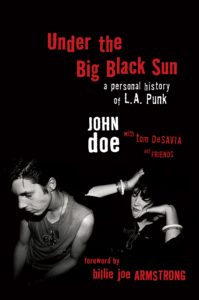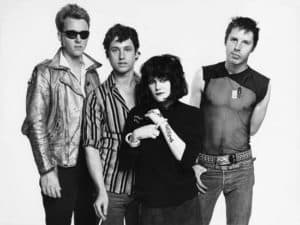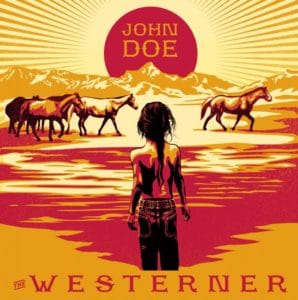John Doe: The 13th Floor Interview
Imagine our surprise when we discovered John Doe, founding member of legendary LA punk band X, had been nominated for a Grammy for his book Under The Big Black Sky: A Personal History Of LA Punk. The book is something of an oral history with chapters written by LA punksters such as Henry Rollins, Dave Alvin and Mike Watt.
We decided to track down John Doe, who is still touring with X (all four original members) and recording as a solo artist. The 13th Floor’s Marty Duda gave him a ring to offer his congratulations.
Click here to listen to the interview with John Doe:
Or, read a transcription of the interview here:
MD: I was excited to see that you had been nominated for a Grammy; so, I thought we should get in touch and talk to you about it; so, congratulations!
JD: Thank you. I’m surprised, to say the least. I didn’t think that Grammys meant much in New Zealand, but there you go.
MD: Yeah, well, we do follow it here as well. There’s not much else going on; so, what are you going to do?
JD: Oh, come on!
MD: No, no. There’s lots going on. Were you expecting to be nominated? Was it a surprise? How did you feel when this happened?
 JD: It was a complete shock. We hoped that it might… I don’t know what your general attitude about life is, but I don’t think that anybody really gives a shit, most of the time, about what we do. I mean, I sent out some emails, and said, “Hey, if you know anybody who votes, ask them to vote for us,” and then that happened; so, it was really pleasant, and I think it’s deserved; but yeah, it’s great! I don’t really believe in art as a competition; so, I think awards are kind of odd, at best. I think competing – like Oscars, and all that kind of stuff – I think it’s odd, but if someone wants to give you a ‘tip of the cap’, and then Los Angeles punk rock has – in some people’s eyes – a more legitimate seat at the table, then I’m all for it.
JD: It was a complete shock. We hoped that it might… I don’t know what your general attitude about life is, but I don’t think that anybody really gives a shit, most of the time, about what we do. I mean, I sent out some emails, and said, “Hey, if you know anybody who votes, ask them to vote for us,” and then that happened; so, it was really pleasant, and I think it’s deserved; but yeah, it’s great! I don’t really believe in art as a competition; so, I think awards are kind of odd, at best. I think competing – like Oscars, and all that kind of stuff – I think it’s odd, but if someone wants to give you a ‘tip of the cap’, and then Los Angeles punk rock has – in some people’s eyes – a more legitimate seat at the table, then I’m all for it.
MD: Yeah, because, let’s face it, if you think about it, punk is not necessarily highly represented in the Grammy world. I can’t think of very much at all that has happened over the last forty years, as far as punk related stuff that I’ve seen on the Grammys; just breaking that down a little bit is an accomplishment, I guess.
JD: Yeah! I mean, not in the original scene: Green Day has gotten a lot of awards. They’re a different kind of punk rock: You know, more a different evolution, they have said, and they owe a lot to the LA sound – however you want to define that sound – but yeah, it’s nice; it’s not bad.
MD: You talk about defining the LA sound: I’d have to say that the X album, Los Angeles, pretty much – if there’s a possibility of defining the sound, because it’s rather diverse – that would have summed it up pretty nicely.
JD: Yeah, I’ll take that! The thing is that all of the earlier punk rock bands, I think, were diverse: in the London scene, The Clash didn’t sound like The Damned, and they didn’t sound like X-Ray Specs, and Blondie didn’t sound like The Ramones or The Talking Heads. Punk rock was as much about what kind of music it wasn’t as much as what kind of music it was; just about making up your own mind and finding something that’s a little bit unique and being free.
MD: I think – especially in this part of the world – when people think of punk, they immediately go to the London thing, and then over to New York, and I think the LA scene gets lost in the shuffle; and really, the whole scene opened up a lot of things that weren’t necessarily considered as part of that… like the Latino influence, Mexican, the rockabilly stuff that really wasn’t entering into it anywhere else.
JD: That’s true. The LA scene had an eye towards original rock and roll people, like Chuck Berry and Fats Domino, Wanda Jackson; people like that; Sun Records.
MD: Absolutely. So, are you planning on going to the awards ceremony?
JD: Sure!
MD: Have you ever been to one?
 JD: I went to an awards ceremony years and years ago – Exene and I were talking about that – and we remember Whitney Huston singing. No one really knew who Whitney Huston was – this in ’85, or something like that – and Whitney Huston came out and sang, and everybody – Exene and I included – went, “What the fuck? Who is this?” “They’re going to be big!” Yeah, I don’t get invited to awards ceremonies. That’s okay. So, it’ll be fun!
JD: I went to an awards ceremony years and years ago – Exene and I were talking about that – and we remember Whitney Huston singing. No one really knew who Whitney Huston was – this in ’85, or something like that – and Whitney Huston came out and sang, and everybody – Exene and I included – went, “What the fuck? Who is this?” “They’re going to be big!” Yeah, I don’t get invited to awards ceremonies. That’s okay. So, it’ll be fun!
MD: I would imagine it would be. It’s at least a time to get out and do a little schmoozing. Maybe you can talk to me a little bit about the writing of the book? Because it’s somewhat unorthodox in the way that you approached putting it out; so, if you can tell folks what you did, and why you did it that way.
JD: Tom DeSavia and my sweetheart had encouraged, and then harangued, and said I should write a book. And I thought, “That sounds like way too much work and discipline,” that I… can muster, but it’s not a natural thing. And then I realised that the most important element of the LA punk rock scene was collaboration between people and a community that we all shared – it was fairly small, but it was powerful – and then I just extended that into the way I wrote the book. At that point, we got a book deal, and Tom and I looked at each other and said, “Holy Shit! Now we have to do this.” And then we just made a big list of what elements made the scene what it was, and thought of people who we thought would be experts in those topics…. Everyone’s telling their story, and it’s a full chapter, rather than an oral history; so, the city of Los Angeles gets to play a bigger part of it. You get more context about what it was like living during that time. Exene’s chapter was about the cultural revolution that we were a part of – because that was something that really concerned her, and that was her thing. And Jane Weidlin wrote about living at The Canterbury – which was a place that everybody hung around and exchanged a lot of ideas; that was our version of salons. And Dave Alvin wrote about the roots music being pulled into it. And Teresa from The Brat wrote about what it was like being from East LA. And these are all these different subjects and truths that I might be able to write about, but I can’t write about it with real expertise or authority. It mirrors the way the scene was back then, and it allows people a chance to tell their story with these overriding subjects.
MD: What would you consider to be your personal story that you contributed?
JD: Mine is partly the role of narrator. I’ll also talk about where people lived in terms of Exene and my apartment, and I’ll also talk about the effect of cars and the city, the way that that affected the scene. I’m part narrator, and then the full chapters that I wrote: one is about song writing: what punk rock is, and what the song writing process was. What it was like for me – as a transplant from the east coast – to find this community that I think existed, or we created here; so, my area of expertise was finding a bohemian community.
MD: You mentioned song writing – writing for punk. The music that you’re doing now, as a solo artist, is kind of roots related. Is there a difference in the way you approach song writing now that you did when you were writing for X?
JD: I hope so. I hope that I’ve evolved a little bit. Actually – many years down the line – I’m more intuitive about song writing. Back then, I approached it more intellectually, and more like a scientist: fitting some of Exene’s lyrics to music that I’d written – or my own – and piecing things together. Now, I try to write both words and music at the same time, and I can do things that are a little more personal, and I’m also more of a story teller, maybe, but not like a journalist; just a story teller.
 MD: I know your most recent album was The Westerner, which came out last April. Have you been continuing writing and doing new stuff since then?
MD: I know your most recent album was The Westerner, which came out last April. Have you been continuing writing and doing new stuff since then?
JD: Ahhhh…no! Now, I’m just working on what I’ve got in front of me! I have some ideas about what I’m going to do next, and it should be good. It should be in a couple of years, probably; but right now, just basking in the glory of being a Grammy nominee.
MD: As well you should!
JD: Well, you know, I’ve toured most of the summer – summer to fall. X did a bunch of touring in December. I’m going back out in February to do an acoustic tour to some smaller cities that I couldn’t get to with the band. And X has its fortieth anniversary this year!
MD: Which is completely mind blowing!
JD: I know! Think of it from our perspective! Like, how many sound checks have we done? A lot! It’s frightening. You don’t want to think about it…. I still wish we could get over to Australia and do an X tour with the Australian X.
MD: Oh, is there…?
JD: Yeah! There’s a band in Australia; more like an indie band. They’re a few years after us. They’re good! I like them.
MD: Are there other plans afoot to celebrate the fortieth anniversary? I know that you guys haven’t been in the studio together in a long time. Have you considered that at all?
JD: It’s tricky. We have, probably, eighty shows booked already, for this year…. We have about eighty shows booked this year, and I’m probably doing an exhibit for the Grammy museum down in LA; and yeah, just celebrating.
MD: Well, it’s definitely worth celebrating, and it’s good to see punk finally rearing its ugly head at the Grammys for once. Because, think of it, The Ramones should have been on at least once, or The Pistols or The Stooges, or somebody, for crying out loud; so, thank god that it’s finally getting some representation. When you think about music that’s actually pushing things forward and making things happen, punk is definitely at the forefront of all that.
JD: I think the time just changes. And for a while, we might have defined Los Angeles; and then NWA came along, and they defined Los Angeles. Somewhere in the middle, Jane’s Addiction defined it. I’m just glad that punk rock, at this point, is still some weird sub-culture, and it’s a place that teenagers and early twenty year olds go and feel free: there’s five or six bands – and it costs, maybe, ten bucks to get in, or five bucks to get in – and they go, and they’re free for a night; and they can do whatever the hell they want. I don’t like that sometimes things become rigid, and there are rules – “This is not cool,” and “This isn’t punk rock, and all that kind of stuff – that’s a bunch of bullshit; but that happens. What are you going to do?
MD: Well, thank you very much for taking time to talk to me. Again, congratulations. And hopefully, you can get to New Zealand sometime. I know you were here, maybe, ten, fifteen years ago….
JD: Not that long ago, but yeah, maybe ten years ago. I hope to too. It’s all time and money… if you know any good promoters, who want to take a chance… I’m not opposed to going to New Zealand. It was very pretty when I was there; I like it.
MD: It still is! Alrighty, thank you very much, and good luck. We’ll be watching you on the night.
The 59th Annual Grammy Awards ceremony will be held on February 12, 2017
- Harry Charles – Storm: 13th Floor New Song Of The Day - 17/12/2025
- Fun Lovin’ Criminals Announce New Zealand Tour Dates for March - 17/12/2025
- Joe Ely Has Died Age 78: R.I.P. - 16/12/2025